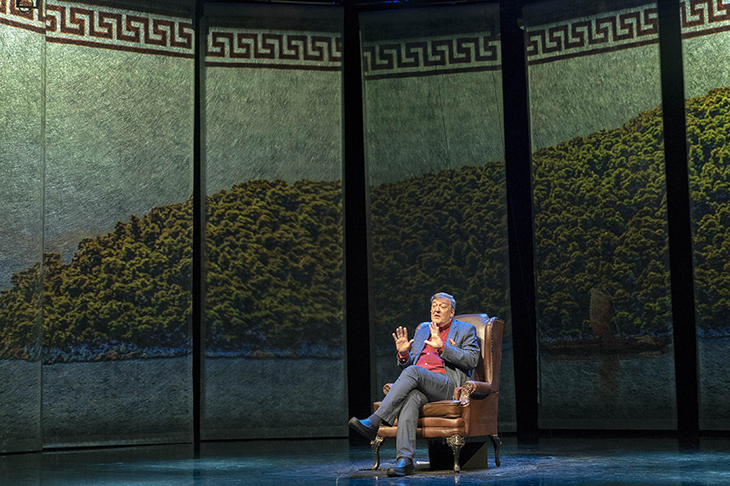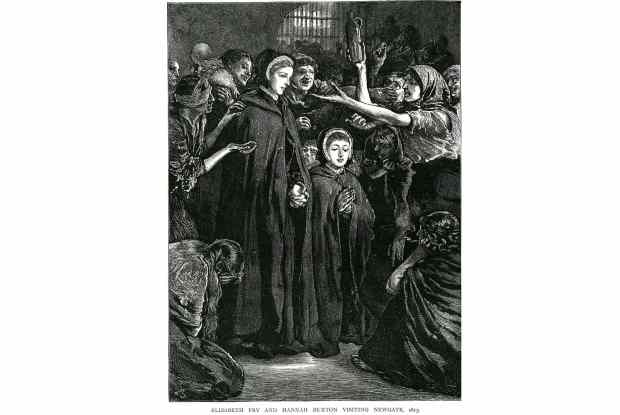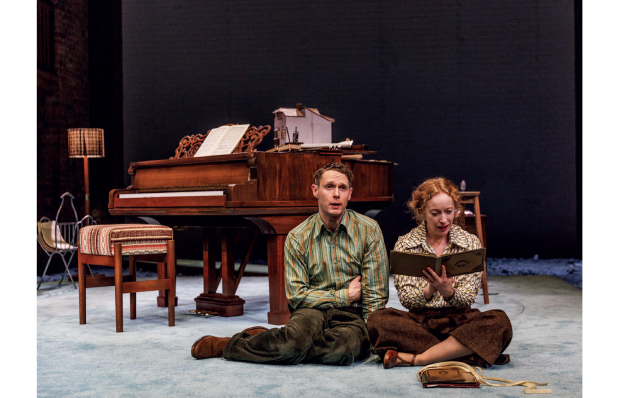Stephen Fry lies prone on an empty stage. A red ball rolls in from the wings and bashes him in the face. He stands up and introduces himself as Odysseus, stranded on an island-kingdom as he makes his way home after the Trojan War. The ball had escaped from the hands of a clumsy maidservant who was playing on the beach with a local princess. Now Fry, as Odysseus, begs her help and asks for a petticoat to cover his nakedness. This tale comes from Homer’s Odyssey, Book Six, but Fry doesn’t quote the reference he merely plunges on with the story. Odysseus shows up at the palace of the local warlord, King Alcinous, and tries to explain how he came to be wearing the princess’s undergarments. From here the scene moves to Troy and Fry tells the extraordinary tale of Paris — rejected by his parents but rescued by a kindly shepherd — who seduced Helen, wife of Menelaus, and brought the fractious states of Greece into a military alliance. Thus began the Trojan War. In the course of 150 minutes (and speaking without notes), Fry covers about a quarter of the Iliad and nearly all of the Odyssey, adding supplementary flourishes along the way. In an interlude on lexicography he dashes off a memorable analysis of hieroglyphics and its replacement by the more sophisticated alphabetic system of writing. The stories that Fry recounts form the basis of European literature and it’s hard to imagine that any performer in the modern age has told them with such lucidity and panache, such mesmerising freshness. When Fry chose to become an actor, the world of classical scholarship lost a teacher of rare creativity and charm. He has the magical ability to conjure up the ancient world as if it were a pleasing corner of his private orchard. At the end, he assured us that the gods of Greece were not dead. ‘They are with us now — in all of us still.’ I came away from this extraordinary performance feeling curiously diminished as a human being, as if I’d been in the presence of someone more than mortal.
Einstein, written and performed by Pip Utton, is an engaging biography of the 20th century’s greatest physicist. Utton has fun exhibiting his subject’s skill as a gag-writer. ‘The only difference between genius and stupidity is that there is a limit to genius.’
Westminster Hour is a psychological thriller featuring an ambitious new home secretary, Archie, who introduces mandatory life-sentences for child molesters. ‘Watch out paedos, Archie’s coming to get you!’ His vengeful ex-girlfriend, Fiona, barges into his office and threatens to expose him as a seducer of underage rent-boys. ‘Mistakes,’ he says, shrugging off his history of gay dalliances. The show can’t quite evoke the bustling reality of the Westminster village with just two actors stuck on a narrow stage but the script boasts plenty of savage polemic. ‘You put the arse into narcissist,’ quips Fiona. ‘I could have you Jill Dando’d,’ growls Archie.
Philip Hammond, the TV doctor, shares his name with the recently discarded Tory chancellor. In Vote Dr Phil, the witty medic mingles traditional stand-up with change-the-world activism. His gags are good and his delivery is faultless. ‘Every nurse’s uniform costs the NHS £99. But at Ann Summers they’re £19.99. And they’re wipe-clean.’ His policies have a single intention: to make doctors’ lives easier. A consultation with a GP should last at least 50 minutes, he argues. A super-tax applied to the top 1 per cent of earners would add £82 billion to Britain’s health budget. And he calls for ‘Tax Pride Marches’ in which grateful citizens will dance through the streets rejoicing at the extra dosh they’re paying to the Treasury.
Keith Moon: The Real Me stars Mick Berry and a drum-kit. Berry may not be the greatest actor in the world but his charm and his enthusiasm for his subject are irresistible. We first meet Moon as an unknown wannabe in the 1960s taking lessons from Soho jazz musicians, one of whom claimed that Charlie Watts was an over-rated talent. The Who enjoyed a modicum of success until the moment when Pete Townshend, egged on by Moon, chose to smash up all their instruments on stage. The myth of ‘Moon the Loon’ was born. Soon they were a massive act with hits on both sides of the Atlantic, but they couldn’t clear their debts because they had to replace their entire musical apparatus after every performance. The rock-opera Tommy saved their fortunes. Moon’s insatiable appetite for booze and pills extended to groupies as well. His wife threatened to leave him. ‘I’m a rock star,’ pleaded Moon. ‘Sleeping with women is what I do. Do you think I enjoy it?’ There’s a Faustian truth at the heart of this gripping show. Moon’s craziness propelled him to stardom but destroyed him in the end. He died of success.
Got something to add? Join the discussion and comment below.
Get 10 issues for just $10
Subscribe to The Spectator Australia today for the next 10 magazine issues, plus full online access, for just $10.
You might disagree with half of it, but you’ll enjoy reading all of it. Try your first month for free, then just $2 a week for the remainder of your first year.














Comments
Don't miss out
Join the conversation with other Spectator Australia readers. Subscribe to leave a comment.
SUBSCRIBEAlready a subscriber? Log in